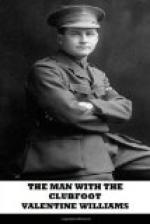I found myself, the only occupant, in a first-class carriage. On the window was plastered a notice, in Dutch and German, to the effect that the carriage was reserved. Suddenly I thought of my bag and overcoat. They were nowhere to be seen. After a little search I found them beneath the seat. In the overcoat pocket was a black tie.
I lost no time in taking the hint. If any of you who read this tale should one day notice a ganger on the railway between Rotterdam and Dordrecht wearing the famous colours of a famous regiment round his neck you will understand how they got there. Then, wearied out with the fatigues of my sleepless night, I fell into a deep slumber, my verdant waterproof swathed round me, Semlin’s overcoat about my knees.
* * * * *
I was dreaming fitfully of a mad escape from hordes of wildly clutching guides, led by Karl the waiter, when the screaming of brakes brought me to my senses. The train was sensibly slackening speed. Outside the autumn sun was shining over pleasant brown stretches of moorland bright with heather. The next moment and before I was fully awake we had glided to a standstill at a very spick and span station and the familiar cry of “Alles aussteigen!” rang in my ears.
We were in Germany.
The realization fell upon me like a thunderclap. I was in the enemy’s country, sailing under false colours, with only the most meagre information about the man whose place I had taken and no plausible tale, such as I had fully intended to have ready, to carry me through the rigorous scrutiny of the frontier police.
What was my firm? The Halewright Manufacturing Company. What did we manufacture? I had not the faintest idea. Why was I coming to Germany at all? Again I was at a loss.
The clink of iron-shod heels in the corridor and an officer, followed closely by two privates, the white cross of the Landwehr in their helmets, stood at the door.
“Your papers, please,” he said curtly but politely.
I handed over my American passport.
“This has not been vised,” said the officer.
With a pang I realized that again I was at fault. Of course, the passport should have been stamped at the German Consulate at Rotterdam.
“I had no time,” I said boldly. “I am travelling on most important business to Berlin. I only reached Rotterdam last night, after the Consulate was closed.”
The lieutenant turned to one of his guards.
“Take the gentleman to the Customs Hall,” he said and went on to the next carriage.




